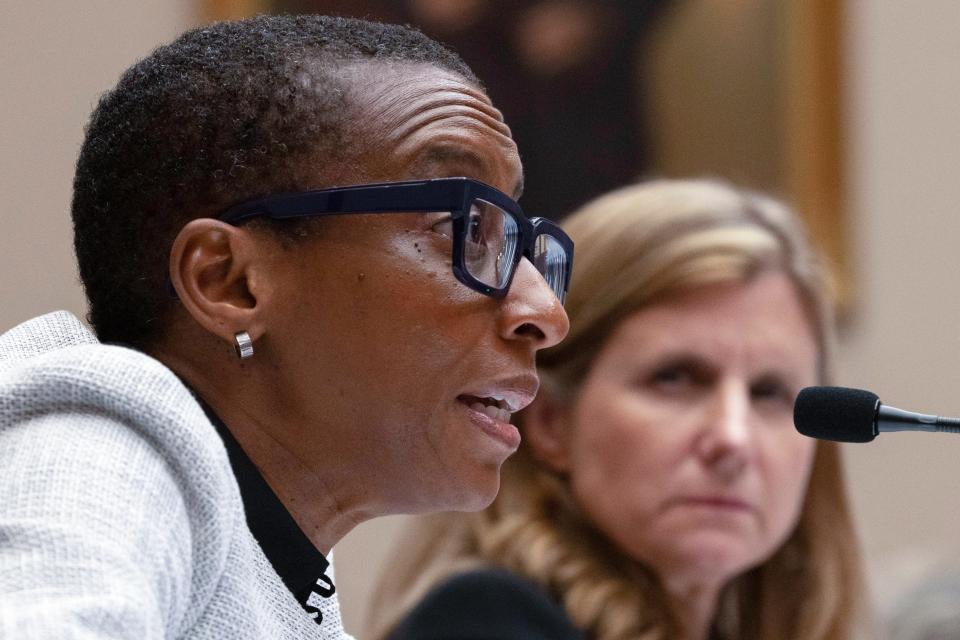Campus political speech has become a minefield. Embrace the challenge | Opinion
Recently three college presidents were called to testify before Congress. They failed to adequately address concerns about their recent apparent lack of action in response to outbreaks of antisemitism toward Jewish students on their campuses. Only one of the three remains in her position today.
This reflects a widespread challenge in higher education. Presidents and chancellors must set the stage for what’s acceptable speech under their codes of conduct and, at public campuses, under the First Amendment. However, encouraging the free flow of ideas inevitably leads to the expression of some that are toxic and hateful.
Striking the right balance has never been easy. It’s much more difficult today. University leaders must also do all they can to make sure their students are safe from harassment and threats.

Many ideas may be hurtful but fall short of direct threats. Some will undoubtedly label the mere exposure to such ideas as “microaggressions.” The use of this term, especially in a college setting, is, however, unfortunate.
None of us benefit from being shielded from speech that merely offends. We do, however, benefit from seeking to understand both the ideas and the motivation of the people who advance the ideas. Hateful ideas are better confronted than left to fester in the darkness.
Give students more leeway than speakers
College leaders should thus use great caution in limiting students from speaking or displaying banners or posters on campus. They should use far less caution when bringing speakers to campus. Students should have an expectation of exposure to a wide variety of viewpoints. They do not have the right to disrupt and deny that right to others.
Claudine Gay was just the start: US college presidents feel a chilling effect
Universities must serve as forums for those advocating a wide spectrum of ideas and ensure that students have space to discuss these ideas. The latter depends on a campus culture of respect for the sharing of profound, forgettable and unpopular ideas.
Administrators, faculty and staff cannot mandate a culture of tolerance. They can, however, encourage it. We all have to trust that the worst of the ideas will not survive scrutiny and discussion. There is no other option. After all, as Pink Floyd philosophized, “We don’t want no thought control.” His minions do, however, need an education.
Take the bumpy, principled road to consistency
Campus leaders are also often called on to articulate university opinions on various social and political issues and the invitation of speakers to campus. It’s always been tricky. It's now a minefield. While there’s no real path to safety, there are many paths to hypocrisy. And there’s also a bumpy, principled road to consistency. That’s the road worth traveling.
In the 1960s millions took stands for civil rights and against the Vietnam War. Those were principled, personal stands. It was inevitable that universities come under pressure to issue statements and otherwise proclaim their values. But does that mean all at the institution must share those values with no room for disagreement or discussion?
Vanderbilt Chancellor Daniel Diermeier, also a member of the Board of Fellows for the University of Tennessee’s Institute of American Civics, has wisely remained steadfast in advocating for and defending Vanderbilt’s policy of principled neutrality. This principle is rooted in the University of Chicago Kalven report, issued in 1967, which urged leaders in higher education to avoid taking positions but rather to serve as a forum for a range of viewpoints.
College is about more than preparing students for careers
Academic leaders are wise to implement this policy. Viewpoint neutrality is consistent with the fundamental mission of a university ‒ the pursuit of truth. Sometimes we forget that college is about more than preparing for one’s career. It’s also about educating students to evaluate positions, think critically and become responsible participants in our democracy.
Education is not about telling people what to think about what constitutes a good society and how to get there. Rather it’s about providing the analytic skills and access to information to form their own opinions. We’ve often strayed from that. It’s not easy. But It’s best to embrace the challenge.
William Lyons is Professor Emeritus of Political Science and Interim Associate Director of The Institute of American Civics at the Howard Baker School of Public Policy and Public Affairs at the University of Tennessee. He also served as Chief Policy Officer for Knoxville Mayors Bill Haslam, Daniel Brown and Madeline Rogero. The opinions expressed are those of the author and do not necessarily reflect the official policy or position of the Institute of American Civics or the University of Tennessee.
This article originally appeared on Knoxville News Sentinel: Campus political speech has become a minefield. Embrace the challenge

